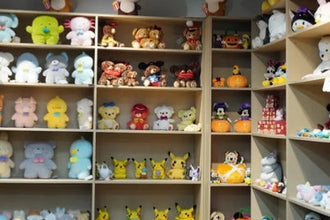Over recent years, attributable to consumers’ need for personalization, innovative designs, and the impact of the digital world, the global market for custom plush toys has seen a relatively steady sectoral growth. The rest of the world has also joined the ranks of captivation. Traditionally thought of as a toy for kids, plush toys are often bought as branded merchandise, gifts, collectibles, and enjoyed by adult corporations as well. This growth, for manufacturers, distributors, retailers, and venture capitalists, brings the need to appreciate the trends that are converging to give birth to novel opportunities.

Key Factors Driving the Growth of the Global Custom Plush Market
1. Rising Demand for Personalization
The custom plush market has been boosted by the increased interest in personalized products. Customers are now able to create customized toys that are made in specific colors, patterns, designs, and even facial expressions. This trend is not confined to children only. More and more adults are buying custom plush products to give out as gifts, or for their own collectibles and home decoration. Personalization is a powerful tool to create emotional and local ties to a customer, which in turn means that they will become repeat purchasers. and this pushes manufacturers to produce a wide variety of personalized products.
2. Growth of E-Commerce Platforms
The custom plush market is one of many whose original contributors were recently only limited to helping hand sewing plushes. The ease of operation which online portals provide as web-based almost eliminates the need of the increasingly rare physical shop. Enhancing adoption of various social media, along with employing other techniques and methods of digital marketing, facilitates the promotion of a business in which they are able to present their business to the public, garner customer attention, and muster sought after business suggestions. The growing demand which is along with the convenience of transport spell the very demise of the plush toy market.
3. Technological Advancements in Production
The perpetual stream of technological advancement in the manufacturing sector becomes a boon to market expansion. The tools of the trade, and as well, other current manufacturing technologies like high precision sewing, embroidering doodles, etc, almost cut the effort which is required to fulfil custom requirements of a client. Such technologies aid in the retention of unimpaired quality production at an lesser time, and along with that, the effortlessness responsiveness aids the customer in being serviced with their dainty requests with growing demand. Moreover, the plush toys with tech interactive attributes, along with the customary serve an extended population.

4. Increasing Awareness of Sustainability
Public awareness of environmental matters is creating change, even getting toys has and intricate process. Plush toys made out of eco-conscious and even recyclable materials has led to many businesses adopting sustainable production strategies. Businesses that utilize sustainable fabrics and low impact dyes enjoy healthier reputations and bolster their brand advocates and brand equity, all while profiting from sustainable market practices.
5. Expanding Regional Markets
North America and Europe’s increasing disposable income and demand for customized products makes them significant and appreciating markets for soft toy sales. Although the Asia-Pacific region continues to reap the benefits of owning a production facility, the increase in demand from these regions is also valuable. In addition, the region of Middle East and Latin America are shifting from emerging markets to rising markets, which is spearheaded by urban populations and exposure to globalized soft toy.
6. Influence of Branding and Licensing
Sales and reputation which are directly related to a brand, along with exclusive characters and design licenses significantly accelerates the market growth. Because of these licenses, customers who are fans or admires of these movies, cartoons, or games tend to become collectors. This in turn, enhances sales opportunity. License agreements and brand collaboration become a resolution for market distribution and credibility, which gives a competitive edge to these custom plush manufacturers.

Regional Insights of the Custom Plush Toys Market
|
Region |
Market Characteristics |
Growth Drivers |
Key Trends and Opportunities |
|
Asia-Pacific |
Dominant production hub; established manufacturing infrastructure; cost advantages |
Skilled labor, large-scale production, supply chain efficiency |
Innovation in design, adoption of automation, focus on export markets |
|
North America |
High disposable income; strong online retail presence |
Personalization demand, e-commerce growth, pop culture influence |
Customized and collectible plush toys, brand collaborations, eco-friendly products |
|
Europe |
Mature market with focus on quality and sustainability |
Environmental awareness, high purchasing power, trend-driven consumers |
Sustainable materials, licensed character plush, premium product lines |
|
Latin America |
Emerging market; growing urbanization and middle-class population |
Increasing exposure to global trends, rising disposable income |
Expansion of e-commerce, introduction of personalized and themed plush toys |
|
Middle East & Africa |
Developing market with increasing consumer interest in customized products |
Urbanization, growing youth population, rising online shopping adoption |
Niche products, luxury and premium plush, collaborations with global brands |

Challenges and Considerations in the Custom Plush Toy Market
|
Challenge |
Description |
Impact on Business |
|
High Production Costs |
Customization and quality materials increase manufacturing expenses |
Can limit profit margins; requires careful pricing strategies |
|
Supply Chain Management |
Coordinating raw materials, production, and distribution for unique designs |
Delays or inconsistencies can affect delivery times and customer satisfaction |
|
Quality Control |
Maintaining consistent quality for highly customized products |
Defects or variations can harm brand reputation and reduce repeat purchases |
|
Regulatory Compliance |
Meeting safety standards and material regulations (e.g., CPSIA, EN71) |
Non-compliance can lead to legal issues and restrict market access |
|
Intellectual Property Issues |
Use of licensed characters or designs |
Requires proper licensing agreements; risk of infringement claims |
|
Market Competition |
Intense competition from mass-produced and niche custom toy brands |
Brands must differentiate through innovation, quality, and marketing |
|
Changing Consumer Preferences |
Trends and pop culture influence demand patterns |
Requires agile production and design adaptation to remain relevant |
|
Sustainability Expectations |
Growing demand for eco-friendly materials and processes |
May increase costs; requires investment in sustainable sourcing and production |
|
Technological Integration |
Need for advanced manufacturing and customization technologies |
High initial investment; requires staff training and maintenance |

Future Outlook of the Custom Plush Toy Market
The demand for custom plush toys is expected to grow primarily due to personalization preferences and ease of design, technologically advanced production methods, potential emotional connections between consumers and the toys, and further emotional engagement through customization allowing for consumers of all ages and backgrounds to demand the toys. Understanding these trends will be important for custom plush manufacturers and suppliers.
1. Continued Growth of Personalization
Personalization will be one of the key elements in driving the growth of plush toys market. There is an increasing demand for toys that show personal preference like custom colors, custom designs, and unique messages. As digital design and online customization technology continues to grow, consumers will be more emotionally connected and brand loyal to businesses due to the engagement fostered by the ability to customize toys. This demand is long-term sustainable since it will grow across various demographics, including adult collectors and purchasers of gifts.

2. Technological Innovation and Automation
The growth of the future will be rooted on technology for custom plush production. The sewing and embroidery machines, and robotics are enabling the production of customized plush toys with increased speed and accuracy. The addition of sound, lights, and motion to the toys will inline further customization, and this will increase the market. The ability of manufacturers to sustain customization with an increase in technology will determine the variety offered.

3. Expansion of E-Commerce and Digital Channels
The relevance of e-commerce to the custom plush market is likely to increase. Online retail platforms allow small and mid-sized brands to access consumers across borders and bypass the constraints of having physical stores. Social media marketing, influencer engagement, and immersive digital experiences broaden market engagement and drive sales. Consumer willingness to order and customize products online will always dictate the market trends.

4. Sustainability and Eco-Friendly Practices
The future of the custom plush toy market will undeniably be shaped, to a certain extent, by sustainability. Eco-conscious consumers are attracted to products that are non-toxic, recyclable, and used responsibly sourced elements. Competitors will be at an advantage if they adopt sustainable production efforts along with eco-friendly packaging. This is aligned to global initiatives, which is a reflection of the market realignment towards responsible and sustainable practices.
5. Emerging Regional Markets
It is true that the dominant regions of the world such as North America, Europe, and Asia Pacific will continue to thrive, but also the emerging continents of Latin America, the Middle East, and Africa will be a source of tremendous growth. Personalized, quality plush toys will be desired more due to growing urbanization, higher disposable incomes, and increased global exposure. Companies that utilize online marketing strategies while tailoring their products to regional specialties have a better chance of survival and growth in these untapped regions.
6. Influence of Pop Culture and Licensing
The custom plush toy market will be driven by pop culture and trends of licensing too. There will be a strong interest in character-themed plush toys, particularly in connection with collaborations with well-known movies and games, cartoons, and online creators. Social media trends will also provide purchase traction through limited releases, collectible series, and other hyperresponsive consumer engagement strategies. Consumers will provide strong brand allegiance.

Summary
The global market for custom plush toys is likely to grow due to the growing demand for personalization, collectibility, e-commerce, sustainable products and innovative technology. The industry's adaptability and responsiveness to consumer demand suggest a promising future. While challenges are present, the industry's adaptability and responsiveness to consumer demand suggest a promising future. As brands attempt to navigate the changing landscape, they must continue to focus on ethical practices to ensure consumer trust and emerging business opportunities.







